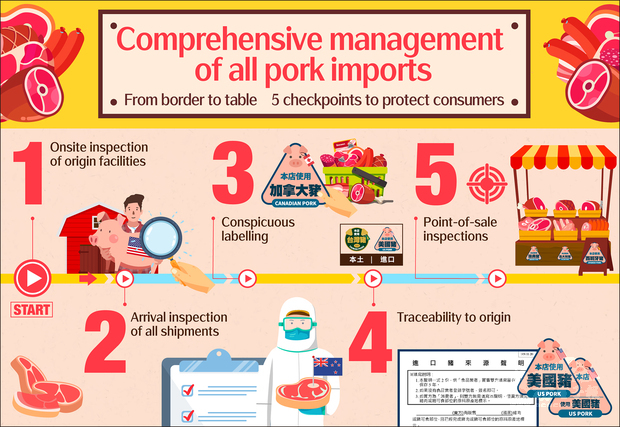
Taiwan's economy is highly dependent on foreign trade. To become a key player in the restructuring of the global supply chain, it must forge closer relations with other world economies, especially the largest of all, the United States. In consideration of Taiwan's trade interests and overall economic strategy, President Tsai Ing-wen announced August 28, 2020 that Taiwan will permit imports of U.S. pork containing ractopamine and U.S. beef from cattle over 30 months old. The president also ordered that a complementary set of measures be in place before the January 1 implementation to safeguard the nation's health while protecting the incomes of hog farmers. Of key importance was the establishment of feed additive residue limits based on scientific evidence and international standards.
This crucial move to resolve years of indecision over U.S. pork and beef imports is expected to deepen Taiwan-U.S. trade relations and bolster Taiwan's case for joining regional trade blocs like the Comprehensive and Progressive Agreement for Trans-Pacific Partnership. Taiwan will also have opportunities for closer trade relations with other countries and to expand its international space for economic and trade growth.
Complementary measures
■ Ensure food safety:
Five specific management protocols have been adopted to guarantee food safety. Pork processors in the U.S. that have not previously exported to Taiwan must first undergo onsite inspection by Taiwan officials before being eligible. Additionally, imports of pork products are now subject to shipment-by-shipment inspection at the border. Pork product manufacturers must clearly indicate the origin of pork used in a manner easily distinguishable by the public, while importers must provide country-of-origin labelling and import origin statements to facilitate food traceability. Finally, enhanced inspections will be conducted and overseen on a special-case basis.
Maximum residue limits of ractopamine in pork have now been established, and a ban placed on imports of high-risk beef parts including skulls, brains and eyes.
■ Boosting domestic hog farming competitiveness with NT$10 billion (US$352.1 million) industry assistance fund:
To protect incomes for hog farmers, the government will regulate sources and diversify sales channels to maintain domestic pig auction prices within a reasonable range. A budget of NT$2.4 billion (US$84.5 million) will be set aside annually to accelerate the restructuring of the pig farming industry while improving business efficiency, the industry's image, and agricultural worker incomes. Subsidies on compulsory mortality insurance for pigs will be available to help farmers lower business risks. Pig farms and slaughterhouses will receive guidance on modernizing and upgrading their facilities in order to meet HACCP (hazard analysis and critical control point) certification standards and reach more international export markets.